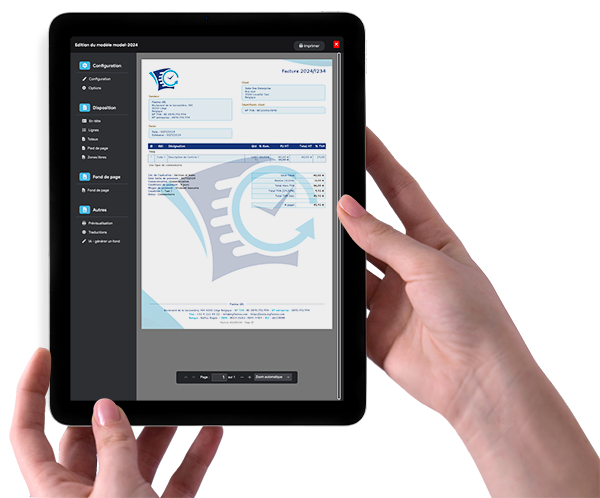How to Manage Company Invoicing in Belgium?
Properly managing your company's invoicing helps ensure its success. To do this, it's essential to ensure that customers regularly pay their invoices. Invoice management therefore represents numerous challenges for a company's success and growth. So, what are the rules to follow for managing invoicing? How to properly organize invoice management? How can our online invoicing software help you manage your company's accounting and financial situation with an iron fist? The Flexina team answers all these questions in this article. Follow the guide and happy reading!
The rules to follow for managing invoicing
An invoice is a supporting document that materializes a financial transaction, but also the service delivered. However, it's important to follow the current invoicing regulations. Indeed, invoice management is regulated by law.
A company must invoice
A company subject to VAT must invoice their professional sales addressed to companies, individuals or public authorities.
If your activity only makes sales to individuals, you are in principle not required to issue an invoice.
Be careful, if you invoice to garages, the construction sector and wholesalers, you will be required to issue an invoice.
Don't have time to dedicate to invoicing? You can absolutely outsource this work by giving a mandate to a trusted person to establish them in your name.
The date of invoice issuance
When should an invoice be issued? That's an interesting question. We list the applicable rules below:
- Note: VAT regulations specify that the invoice must be issued before the 15th day of the month following the end of the service provision or delivery of goods.
- It's important for the company to keep a copy of each invoice sent. During an unexpected audit, it's always better to have all documents concerning your company's accounting and financial management.
What are the formats for creating invoices?
A company can create invoices in paper format or electronic format. Indeed, the tax administration tolerates electronic invoicing if the company uses electronic signature and uses electronic data exchange to transmit invoices.
Note that an invoice created in paper format (via Word) scanned and sent electronically is not considered an electronic invoice by the Belgian tax administration.
Mandatory information on invoices
In a professional context, issued invoices must contain numerous mandatory information under risk of being sanctioned by a fine and criminal penalty.
The mandatory mentions are as follows:
- The word "invoice"
- Your company information: company name, VAT number, complete address and bank account number
- Your customer's data: company name, complete address and VAT number
- The issue date
- The billing date
- The delivery date (goods) or service date
- The unique and sequential invoice number (no gaps in numbering)
- The description of each service or product and their quantities, unit prices and discount given as well as their purpose.
- The tax base: the total amount excluding VAT.
- Any discounts deducted from the total amount excluding VAT.
- The VAT rate.
- The total price including VAT.
- Payment terms
Keeping your invoices | The obligations
Invoices must be kept for at least 7 years, as they are important supporting documents.
How to properly organize your company's invoicing?
If you want to properly organize your invoicing, it's important to implement a process that goes from invoice creation to tracking its complete collection. To help you, here are some important points:
- the triggering event for invoicing: this is the moment when the customer must be invoiced. It's essential to invoice the customer quickly. This will allow the company to receive payment from its customer as soon as possible;
- the invoicing process: to properly organize its invoicing, the company must clearly define the process it wants to implement. Who handles invoicing? How should an invoice be transmitted to a customer? How to create it, etc. These are questions the company will need to answer if it wants to better manage its invoicing;
- invoice tracking: they must be tracked. A company is never safe from an unpaid invoice. That's why it must take all necessary measures to optimize customer collections, and therefore its cash flow. In case of late payment, customer follow-up must be done quickly. Initially, the company can contact the customer to remind them. If this action has no effect on the customer, a formal notice must be sent by registered mail with acknowledgment of receipt;
Manage your company's invoicing with Flexina
Our online invoicing software allows you to serenely ensure your company's accounting and financial management. At any time you can record a complete or partial payment of your invoices to easily manage your operations. Moreover, thanks to our different statuses, with a simple click you can have a view of all your paid, unpaid, overdue invoices and much more. That's not all, you can even have a clear idea of your turnover (by day, month, year or determined period). Additionally, Flexina Invoicing gives you access to numerous invoicing statistics with or without graphs on for example: your customers, VAT rates, representatives, Countries, customer families, item families...
As you'll understand, properly managing a company's invoicing is essential. And you, how do you manage your invoicing? Have you encountered problems managing your invoices? Share your experiences in the comments. Don't forget that you can come test our software for 15 days. You can thus get a more precise idea. The entire Flexina team is here to help you or answer all your questions. So don't hesitate to contact us.




